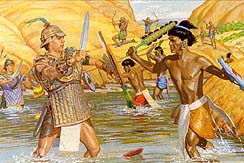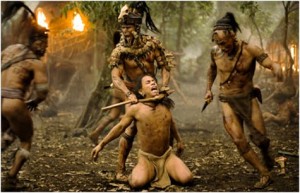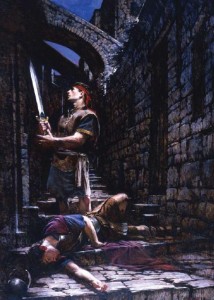“Atticus” returns to talk about war and law. Because he is an active member of the military, we decided it would be best to keep his real name private. Enjoy his post!
The Book of Mormon is full of war stories, strategies and bloodshed. I’ve heard lots of people say that it’s proof the Book of Mormon was made for our times because we have so many wars – I’d say so many war stories, but as for war, this is a safe time to be alive. I thought it would be fun to take a modern approach to some of these war stories. Just for fun I’m going to use the current Law of Armed Conflict (LOAC, also known as International Humanitarian Law in many countries).
First, a very rough crash course in LOAC. This is very simplified, and nothing like the hours long presentations I’ve given. I will not deal with Jus Ad Bellum, just Jus In Bellum because we will assume that war is already rightly in progress for all of our analysis. The first principle is military necessity which says any target must create some military advantage. This is a very low standard. Just about anything a military does can create military advantage. Knock out a damn that provides drinking water to millions of people to kill one enemy soldier? Yes. Bomb a village full of civilians to kill one enemy soldier with a broken leg? Yes. As I said, it’s a low standard, and only the first one. So don’t panic.
 The second principle is proportionality: Any military advantage must be proportional to the collateral damage. Knock out a dam that provides drinking water to millions of people to kill one enemy soldier? No. Bomb a village full of civilians to kill one enemy soldier with a broken leg? No. This is a much higher standard. And because it is a balancing test, proportionality plays a larger role in small conflicts – Iraq, Afghanistan – than in large conflicts – WWI, WWII – where losing means enemies march in your capital. Don’t confuse proportionality with what it’s not – a balancing test of the amount and type of force used. If an enemy soldier pulls a small knife and charges the fort, I don’t need to pull a small knife to defend the fort; I can drop a 1,000 pound bomb on him.
The second principle is proportionality: Any military advantage must be proportional to the collateral damage. Knock out a dam that provides drinking water to millions of people to kill one enemy soldier? No. Bomb a village full of civilians to kill one enemy soldier with a broken leg? No. This is a much higher standard. And because it is a balancing test, proportionality plays a larger role in small conflicts – Iraq, Afghanistan – than in large conflicts – WWI, WWII – where losing means enemies march in your capital. Don’t confuse proportionality with what it’s not – a balancing test of the amount and type of force used. If an enemy soldier pulls a small knife and charges the fort, I don’t need to pull a small knife to defend the fort; I can drop a 1,000 pound bomb on him.
The second and third principles are distinction and chivalry. Distinction says you should distinguish yourself from the civilian population – uniforms, arm bands, etc – and have a chain of command controlling the armed forces. Military bases should be far from schools, hospitals and POW camps clearly marked, etc. Chivalry says camouflage is ok, but not dressing up like nuns and sneaking into the enemies camp. Causing unnecessary suffering is also out – you shoot to kill, not wound. War means fighting, and fighting means killing, if you don’t want a man dead, don’t shoot him. But once he’s wounded you must treat him the same as your own brothers and sisters in arms and treat his wounds. Also, take prisoners when they surrender or are wounded and therefore no longer lawful targets. This was short and dirty, but it’ll have to do.
The first guy to die in the Book of Mormon is Laban. Let’s assume Lehi has started a sovereign nation in the wilderness and Laban started a war with him when he stole his goods – a bit of a stretch, I know. When Nephi finds Laban passed out drunk in the street and cuts his head off, is it legal? Under LOAC, yes. Laban, as the captain of 50, is an enemy combatant, so killing him creates some military advantage. No civilians die in Nephi’s attack, there is no need for a proportionality balancing test. There is nothing in the rules of modern warfare that says you have to take a prisoner unless the enemy surrenders. It’s the enemies job to surrender before he is killed, or in Laban’s case, his head is chopped off. Being asleep is no exception.
However, Nephi puts on Laban’s clothes and pretends to be Laban. In doing so, he violates LOAC and becomes a spy. Spies, by their nature, are not following LOAC. Remember, you can hide, use camouflage, but you can’t pretend to be someone you’re not. You can’t say you’re just a civilian to sneak into your enemies fort. If you do, and get caught, you’re not a POW, you’re a criminal. If Nephi had been caught acting like Laban, he’s just a spy, a criminal.
When Moroni’s army surrounds Zarahemnah’s army and asks him to surrender or die there is obviously no  problem. (See Alma 44) (Interestingly, beforehand Mormon talks about strategy being a possible moral issue, but fair fights are not an issue in LOAC. Once war is on, let your horses run). It’s what happens next that causes a problem. Zarahemnah refuses to surrender, and continues as an combatant and lawful target. But Moroni’s lieutenant scalps Zarahemnah. Scalping surely falls under unnecessary suffering. Moroni’s man wounded Zarahemnah just to ad emphasis to his message. In today’s military, it’s time to draft charges and convene a court-martial. Ironically, had he just killed Zarahemnah and started killing the rest of the enemy combatants when they failed to surrender, it would be time to draft the award package.
problem. (See Alma 44) (Interestingly, beforehand Mormon talks about strategy being a possible moral issue, but fair fights are not an issue in LOAC. Once war is on, let your horses run). It’s what happens next that causes a problem. Zarahemnah refuses to surrender, and continues as an combatant and lawful target. But Moroni’s lieutenant scalps Zarahemnah. Scalping surely falls under unnecessary suffering. Moroni’s man wounded Zarahemnah just to ad emphasis to his message. In today’s military, it’s time to draft charges and convene a court-martial. Ironically, had he just killed Zarahemnah and started killing the rest of the enemy combatants when they failed to surrender, it would be time to draft the award package.
Another Book of Mormon story that stands out under today’s LOAC is when the Nephites are giving wine to their Lamanite prisoners to see if the wine is poisoned. (See Alma 55:30-32) We don’t even need to get into the details of the law to see how this plays out by today’s standards. Imagine if a modern nation gave food to its prisoners just to see if it’s poisonous. The outcry would be massive. People would demand it stop and those responsible prosecuted. But when reading the Book of Mormon, people often think about how smart the Nephites were.
What I find the most interesting about these different scenarios, is if they happened today we would have no trouble spotting the issues. Decapitating an army’s leader? Well done. Scalping someone to send a message on a modern battlefield? Horrible. Poisoning prisoners? Barbaric. It wouldn’t even take a LOAC scholar to spot the problems, but when we read them in the Book of Mormon, we often times miss them. Standards change, and we should be aware of that when we read scripture or we’ll miss the humanity in their pages.







Very interesting perspective. I loved it.
The problem with this blog is that those rules though they may be written for war today are not kept and probably never were. There are pilots sitting in ‘video game booths’ in America remotely guiding drones in ‘enemy territory’ and bombing the hell out of a place or targeting an individual suspected of being an ‘enemy combatant’.
The nasty part of the Laban story is the fact that he didn’t have an army going up against Nephi. Nephi found him passed out drunk. Why was an ANGEL telling him to kill an incapable person? Why couldn’t the angel have taken care of it himself and not turned poor young Nephi into a murderer who could never be forgiven unless his own blood was shed?
I don’t see the need to turn this ghastly story into anything ‘fun’ Paul. All the blood thirsty stories in ‘holy’ books are really about the desire for power and the prowess that conquest feels like. I see this blog as an epic fail.
Jean, that these norms are often not followed is irrelevant. They are prescriptive not descriptive.
I’d like to address your mischaracterization of the Laban affair.
You claim that “he didn’t have an army going up against Nephi.” Whether his servants were pursuing Nephi at that very moment we are not told, but we are told that they recently were pursuing him and attempting to slay him (1 Ne. 3:25).
You ask “Why was an ANGEL telling him to kill an incapable person?” An angel did not tell him this, the Spirit did. And the Spirit gives a utilitarian rationale, including that “the Lord slayeth the wicked to bring forth his righteous purposes.” Nephi recognizes several other reasons including duty to God, self-defense, and the just response to robbery.
“Why couldn’t the angel have taken care of it himself and not turned poor young Nephi into a murderer who could never be forgiven unless his own blood was shed?”
Again there was no angel involved.
I’m sure we can speculate on reasons why the Lord has men act instead of doing everything himself. One obvious one would be that it teaches men obedience to God.
Murder does not equal killing (see for example murder vs manslaughter). That Nephi killed someone does not make him a murderer. Suggesting that he would never be forgiven [by God] for obeying God’s commandment is illogical.
You write “[a]ll the blood thirsty stories in ‘holy’ books…” This story is the opposite of bloodthirsty. Nephi did not want to shed blood. He did it reluctantly. He did not relish it. He did not celebrate it.
The Book of Mormon celebrates peace. It deplores aggression. It approves of self-defense. It praises pacifism.
Another point.
Who’s blood is going to cry against Nephi for justice for slaying Laban? Laban can’t. He’s estopped (http://en.wikipedia.org/wiki/Estoppel) from doing so.
How can Laban claim that it was unjust for Nephi to slay Laban in order to acquire his property (the Brass Plates) when Laban himself had acted on that very same maxim when he attempted to slay Nephi in order to acquire his property? He can’t. He’s estopped from doing so. IANAL.
How about “interesting” instead of “fun”? I think the main point of this is essay is found in this paragraph: “Another Book of Mormon story that stands out under today’s LOAC is when the Nephites are giving wine to their Lamanite prisoners to see if the wine is poisoned. (See Alma 55:30-32) We don’t even need to get into the details of the law to see how this plays out by today’s standards. Imagine if a modern nation gave food to its prisoners just to see if it’s poisonous. The outcry would be massive. People would demand it stop and those responsible prosecuted. But when reading the Book of Mormon, people often think about how smart the Nephites were.”
It seems we dismiss things just because they are in holy books… I think we might be on the same page here.
Some other points missed. What about the how the BoM teaches that men should not participate in unjust wars? When Mormon refused to fight with the army because the war was unjust. The Lamanites (Anti-nephi-lehis) that killed Nephites in unjust wars considered their acts murder. What about keeping prisoners of war that are innocent or say they will not hurt anyone when released? (Guantanamo Bay anyone?)
D&C 98 are words to live by even if you don’t believe in God.
What’s troubling about Nephi’s experience is that the scriptures teach that the “wicked destroy the wicked.” Are we to believe that Nephi is wicked? Why couldn’t a wicked person kill Laban? According to D&C 98 Nephi’s killing of Laban could be justified since you can extrapolate 3 offenses made against him and his family – although that doesn’t negate why a wicked person couldn’t have killed Laban.